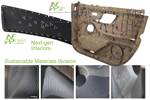Forvia launches Materi’act brand to develop, produce sustainable materials
Materi’act to propose materials including low CO2 carbon fibers, bio-based and carbon-capturing compounds and more, with up to 85% CO2 reduction.
Share
Read Next

Photo Credit: Getty Images
Automotive technology company Forvia (Nanterre, France), comprising the Faurecia and Hella brands has created Materi’act, a new brand that develops, sources, produces and sells cutting-edge sustainable materials with a low and ultra-low footprint — up to 85% CO2 reduction versus current materials. The range of products include recycled, bio-based and carbon-capturing compounds, bio-based foils, low CO2 carbon fibers and green steel for the automotive industry and beyond. All sustainable materials from Materi’act are aligned with the European Green Taxonomy.
The new entity brings more than 10 years of expertise in formulating and processing recycled and bio-sourced materials, including experience in variability management. According to Forvia, Materi’act will accelerate its ambition to become CO2-neutral in its vehicles, in line with OEM objectives and end user wishes. With sustainable materials, Materi’act will also further progress the industry’s net-zero emissions goals.
From waste and bio feedstock management to renewable materials, Materi’act mobilizes an entire ecosystem. For example, biomass introduction in compounds is enabled by the joint venture APM with Interval, an agricultural cooperative producing hemp and its co-products such as fibers. Recycled content introduction in compounds is enabled by a joint development agreement with key partners. Biomass introduction in coated materials is, for instance, supported by a joint development agreement and a commercial agreement with Ananas Anam (London, U.K.) to develop and sell a sustainable alternative to leather made from pineapple fiber waste. By developing strong partnerships for bio-sourced and recycled materials, Materi’act is said to be securing feedstock quantities and industrial readiness to meet customers’ performance requirements and to have a sustainable impact on the industry.
“Rethinking the way we design, manufacture and use our products is a necessary step in the fight against climate change,” Rémi Daudin, vice president, Sustainable Material Division, says. “Sustainable transformation of businesses is not just about reducing the negative impacts on the environment but also about creating a sustainable and profitable ecosystem. With Materi’act, we aim at developing innovative material solutions while contributing positively to the industry, society and the environment.”
Materi’act will be headquartered in Lyon, a dynamic and attractive industrial and academic city in France in the field of chemistry. A new research and development (R&D) center, as well as a pilot workshop, will be operational in 2023 to continue enabling the development of sustainable materials with stringent technical requirements, and to meet future environmental regulations. Materi’act will employ 400 talents in 2025 and expects to generate more than €2 billion in sales in 2030.
Related Content
-
Infinite Composites: Type V tanks for space, hydrogen, automotive and more
After a decade of proving its linerless, weight-saving composite tanks with NASA and more than 30 aerospace companies, this CryoSphere pioneer is scaling for growth in commercial space and sustainable transportation on Earth.
-
Plant tour: Joby Aviation, Marina, Calif., U.S.
As the advanced air mobility market begins to take shape, market leader Joby Aviation works to industrialize composites manufacturing for its first-generation, composites-intensive, all-electric air taxi.
-
Natural fiber composites: Growing to fit sustainability needs
Led by global and industry-wide sustainability goals, commercial interest in flax and hemp fiber-reinforced composites grows into higher-performance, higher-volume applications.
















